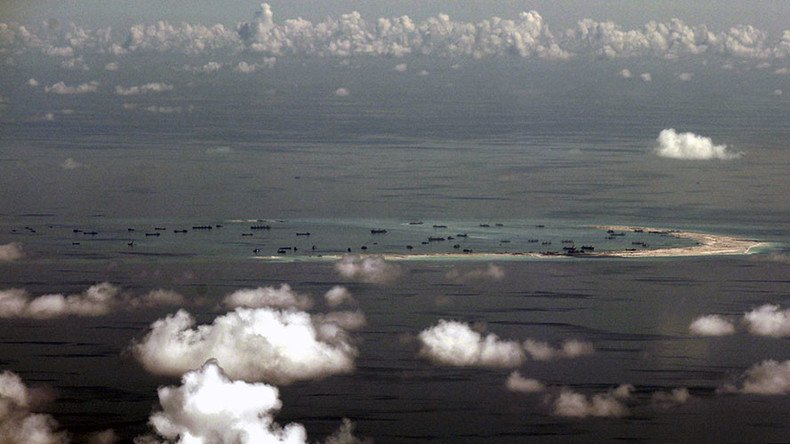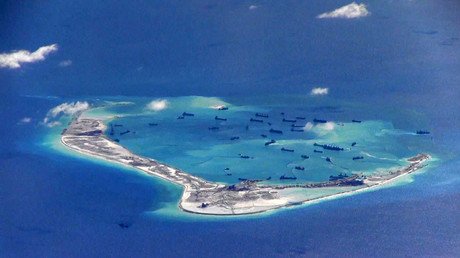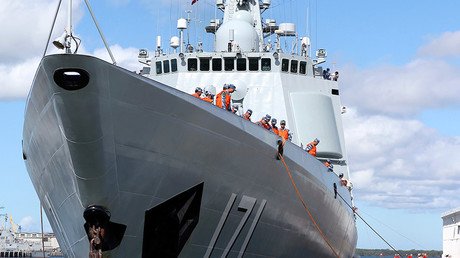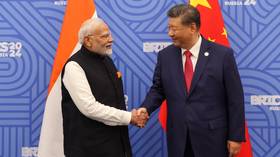‘Selective approach:’ China slams US statement on Hague Tribunal’s South China Sea ruling

China’s Foreign Ministry blasted a statement issued by the US State Department endorsing Tuesday’s ruling on China’s territorial rights in the South China Sea by The Hague’s arbitration court. It also filed a note of protest with the US over its statement.
China is “strongly dissatisfied with and firmly opposed to” the US statement, adding that it “lodged solemn representations with the US side,” a statement issued by the Chinese Foreign Ministry on Wednesday said.
“The US statement turned a blind eye to the facts and endorsed a ruling that is illegal and invalid,” Chinese foreign Ministry spokesman Lu Kang said in commenting on the US statement.
Kang also stressed that such actions go “against the spirit of the rule of law, international law and basic norms governing international relations.”
“The US is always selective when it comes to the application of international law: citing international law when it sees fit and discarding international law when it sees otherwise. It keeps urging others to abide by the United Nations Convention on the Law of the Sea (UNCLOS) while refusing to ratify the Convention to this day,” he added.
China’s Foreign Ministry also urged the US to “stop advertising the illegal arbitration and meddling with the South China Sea issue, and cease undermining China’s sovereignty and security interests and escalating regional tensions.”
On Tuesday, the US said it “strongly supported” the ruling on the South China Sea dispute, stressing that “the Tribunal unanimously found that the Philippines was acting within its rights under the Convention in initiating this arbitration.”
“The Tribunal’s decision is final and legally binding on both China and the Philippines,” US State Department spokesman John Kirby said in a statement on Tuesday, adding that the US expects that “both parties will comply with their obligations.”
The statement also called on “all claimants” to refrain from “provocative statements or actions.”
China’s Wednesday statement also slammed The Hague’s arbitration court ruling once again, calling it “a political farce under the cloak of law.”
“The ruling is null and void with no binding force,” the statement from the Chinese ministry said, adding that it “severely deviated from the common practice of international arbitration.” China also stressed that it will continue to protect its sovereignty, maritime rights and interests.
On Tuesday, The Hague Tribunal rejected China’s claims to “historic rights” in the South China Sea in a case brought by the Philippines, ruling that China had violated the Philippines’ sovereign rights.
China says it does not recognize the validity of the decision and will accept no measures taken on the basis of the outcome of the arbitration case. It also stressed that the tribunal’s ruling will have no effect on its sovereignty and interests in the region.
The dispute over the South China Sea involves the Spratly and the Paracel Islands. Beijing’s territorial claims to the islands partly overlap those of the Philippines, Vietnam and Taiwan, while Beijing also has ongoing territorial disputes in the area with Malaysia and Brunei.
Beijing is also setting up defense installations in the area to support its claims over the disputed zone. The US Navy has been fiercely opposed to this Chinese initiative and has deployed additional warships in the region.
Meanwhile, the US has been carrying out maneuvers near China’s artificial islands, claiming that they are being conducted in the interest of “freedom of navigation.” At the same time, China has branded Washington’s involvement in the dispute as the “greatest” threat to stability in the region.















